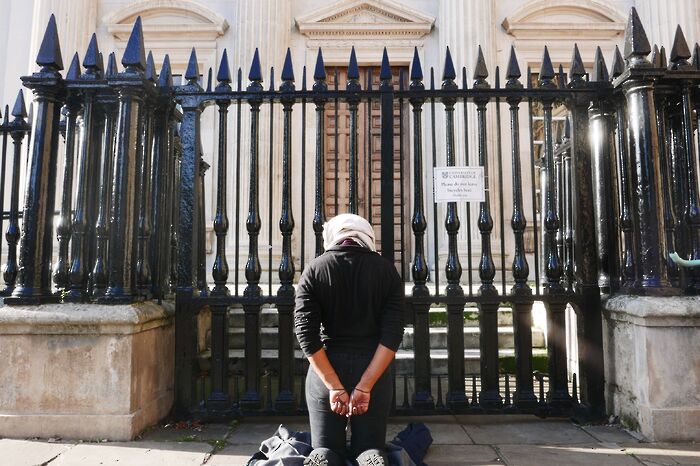Students and staff caught in the government’s ‘hostile environment’ immigration policy
The Cambridge branch of the University and College Union (UCU) has recently began campaigning on the issue of the government’s ‘hostile environment’ policy towards immigrants

Although they noted that they “haven’t been victimised in any way as of yet”, one international graduate student said that the government’s ‘hostile environment’ immigration policy is “like a spider’s web in which you’re already stuck” or “a ticking bomb”.
The Cambridge branch of the University and College Union (UCU) has recently began campaigning on the issue of the government’s ‘hostile environment’ policy towards immigrants.
At the beginning of November, Cambridge UCU held a meeting with representatives from Unis Resist Border Controls (URBC) and International and Broke, two groups campaigning against punitive immigration measures, with the aim of offering staff and students the opportunity to discuss ways in which to push back against the government’s policies.
The Cambridge UCU graduate representative, currently on a Tier 4 student visa, told Varsity that students on this type of visa are left “on their own” in the collegiate system if unable to produce the money required for the visa in full, amounting to around £1,000, because Tier 4 visas are not covered by the loan system at Cambridge, nor at any other university in the UK.
They described the ‘hostile environment’ policy as “horrible policy that has ruined the lives of a lot of people”, adding: “there’s something horribly wrong with the immigration system in this country”.
Another student, Ahsan Memon, an engineering postgraduate student, explained that his application process began with a pre-application that took almost twice as long to get back to him as he was told to expect, ultimately receiving the results one day after scholarship applications had closed.
A spokesperson for the University told Varsity that “Following a decision by the Post Graduate Admissions Committee in 2017, all Postgraduate applicants must apply for admission via the University Graduate Applicant Portal (which has been used since September 2016). Applicants cannot be considered via any ‘pre-selection processes’”.
During a long and confusing application process, Memon felt that he was being “passed around admissions offices”.
Memon also told Varsity about his difficulties procuring a Confirmation of Acceptance for Studies (CAS), something required by UK immigration laws to prove that a university will sponsor the application for a student visa.
Having arrived at the University, Memon formally complained about the way he had been handled by various admissions offices, but eventually withdrew this complaint, explaining that he “didn’t come to Cambridge to fight with the admissions office”.
Following campaigns by international staff and students, some progress has been seen in recent years, including reimbursement measures to cover visa costs and policies aiming to prevent deportations. A UCU campaign also brought about a change in government policy to allow migrant workers to exercise their right to take industrial action without affecting their ability to remain in the UK.
Speaking to Varsity about Cambridge specifically, however, Cambridge UCU branch secretary Waseem Yaqoob, said that “the response of this University has been characteristically weak”.
He claimed that the measures already rolled out by the University’s administration showed “little democratic oversight.”
“The University markets itself as a global institution and a world leader in research. It has a duty not to leave it to staff and students to face the burden of the 'hostile environment' alone”, added Yaqoob.
A University spokesperson said that “the University’s International Student Office provides dedicated support to all international students applying for a student visas to study at the University”.
The Cambridge UCU graduate representative emphasised the University’s role in changing government policy: “‘Oxbridge has the power to lobby against a lot of these hostile environment policies. [...] The onus is on them”.
Speaking about the ‘hostile environment’ in general, they added, “This is a government policy that has discretion as its hallmark”, explaining that “no case looks the same but they’re all caused by one and the same thing: institutionalised racism and institutionalised apathy.”
As for future efforts to improve conditions for international students and staff, a workshop has been held by URBC, and the UCU intends to embark on a ‘Map Your University’ scheme. This will enable immigrants to trace the ways in which they have been institutionally victimised.
The UCU also plans to conduct a survey of international students, saying: “For now we’re gathering information.”
 News / SU reluctantly registers controversial women’s soc18 December 2025
News / SU reluctantly registers controversial women’s soc18 December 2025 Features / Should I stay or should I go? Cambridge students and alumni reflect on how their memories stay with them15 December 2025
Features / Should I stay or should I go? Cambridge students and alumni reflect on how their memories stay with them15 December 2025 News / Dons warn PM about Vet School closure16 December 2025
News / Dons warn PM about Vet School closure16 December 2025 News / Cambridge study finds students learn better with notes than AI13 December 2025
News / Cambridge study finds students learn better with notes than AI13 December 2025 News / Uni registers controversial new women’s society28 November 2025
News / Uni registers controversial new women’s society28 November 2025









